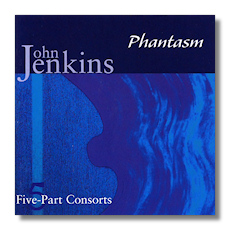
The Internet's Premier Classical Music Source
Related Links
- Jenkins Reviews
- Latest Reviews
- More Reviews
-
By Composer
-
Collections
DVD & Blu-ray
Books
Concert Reviews
Articles/Interviews
Software
Audio
Search Amazon
Recommended Links
Site News
 CD Review
CD Review
John Jenkins
Five-Part Consorts

- Fantasy 1 in G Major
- Fantasy 7 in C minor
- Fantasy 9 in C minor
- Fantasy 17 in C Major
- Pavan 2 in G minor
- Fantasy 11 in C minor
- Fantasy 6 in G minor
- Fantasy 13 in D minor
- Fantasy 15 in D Major
- Fantasy 12 in D minor
- Fantasy 16 in D Major
- Fantasy 14 in D minor
- Fantasy 3 in G minor
- Fantasy 8 in C minor
- Pavan 1 in G Major
- Fantasy 5 in G minor
- Fantasy 2 in G minor
- Fantasy 4 in D minor
- Fantasy 10 in C minor
- Pavan 3 in F Major
Phantasm
AVIE AV2120
John Jenkins lived from 1592, when the Elizabethan madrigal and consort were at their zenith, to 1678, when Purcell was beginning to compose. We know little of his long life. What we do know suggests a more sociable and even-tempered personality than might conventionally be thought likely, given the at times sensuous and troubled music which he wrote. Jenkins' four-part fantasias probe and fail to conclude. His six-part consorts (Avie AV2099) supply a lushness that quite takes one aback. Here is a superb and atmospheric CD of the complete five-part consorts, twenty in all. They are thought to have been composed as early as the 1620s yet show a maturity and grasp of the medium that make them immediately appealing.
Playful isn't the word; though there is certainly joy in Jenkins' exciting new effects. Nor experimentation, despite exploration of pulse in particular. Nor yet out and out innovation; though Jenkins is fascinated with stretching what is possible when metrical accents are displaced. He somehow pushes unusual offsets of predominant beat from the front. But not self-consciously so; his command and confidence with rhythm make the pace and surprises (it's often impossible to predict strong and weak accents) nuanced and persuasive. Fantasies 14 and 16 are good examples. Jenkins really does seem to be taking us on rather a wild ride where the implied and actual directional pull of the music – in terms of harmonic orientation – is working contrary to the accepted rules of 'gravity'.
Similarly Fantasy 15 takes amazing liberties with rhythm. Lawrence Dreyfus, who contributed the liner notes for this recording, describes how Jenkins takes players and listeners on such distant excursions from the expected that he and his colleagues often break into collective laughter when they do successfully arrive at the same endpoint in such pieces as this; and do so having foregone bar lines into the bargain! Not that these are mere tricks to impress. They are in the service of mood, atmosphere, sensibility and the painting of feelings: the melancholy and heartbreak of the Pavan number 2 (tr.5) and Fantasies like the 13th convey rich pathos, sadness and dour depression. And convey them by the rigor, not the casual or superfluous whim, of an intended and nicely restrained disorientation. What Phantasm invariably brings out is the way in which these explorations work and are not in any way exotic or novel. After a few listenings to this wonderful CD, you'll become engrossed in the music in just the way Jenkins surely intended you to be. At the same time you'll be able to listen in a detached enough manner to be able to see the composer for the expert he is – as one does with Beethoven say: with him and also within his world. the turns in pace and beauty of melodic texture of the 11th Fantasy alone make that point.
Phantasm, long at home in this repertoire, perform excellently from beginning to end. They are, of course, four accomplished viol soloists – Laurence Dreyfus (treble viol, director) Wendy Gillespie (treble viol), Jonathan Manson (tenor viol), Markku Luolajan-Mikkola (bass viol) with Mikko Perkola (tenor viol) – who came together in 1994 from Great Britain, Finland and the United States specifically to advocate the splendor and passion of the rich sonorities of viol music from the sixteenth to eighteenth centuries. One of their aims seems to be to arrive at a comfortable and yet persuasive blend between the individual (melodic) lines in music such as that we hear on this CD and the polyphonic impact it should make when all four members of the ensemble play as one. Jenkins certainly presents some challenges in his five-part consorts. They are ones to which the members of Phantasm live up admirably.
This is a disk that's forward-recorded and full of presence; the viols sound at the same time fruity and round, yet fresh, spontaneously played and very, very natural. As if they were playing for us in our listening room. The pieces as Jenkins presumably numbered them are not played in any kind of order except, perhaps, to provide contrast and a crescendo of appreciation of just how important and accomplished a composer Jenkins is – or, as Dreyfus says, "Let me come straight out with it. Jenkins is a marvel." He is indeed. If you enjoy the complexity, profundity and beauty of seventeenth century consort music played to perfection yet without every end tied up, thus leaving room for real listener involvement and/or want to discover something new yet with some of the breadth and power of Byrd, you should take a very close at this excellent CD. Recently nominated in the "Early Music" section of the prestigious Gramophone Awards for 2007, this CD is very much recommended.
Copyright © 2007, Mark Sealey




















